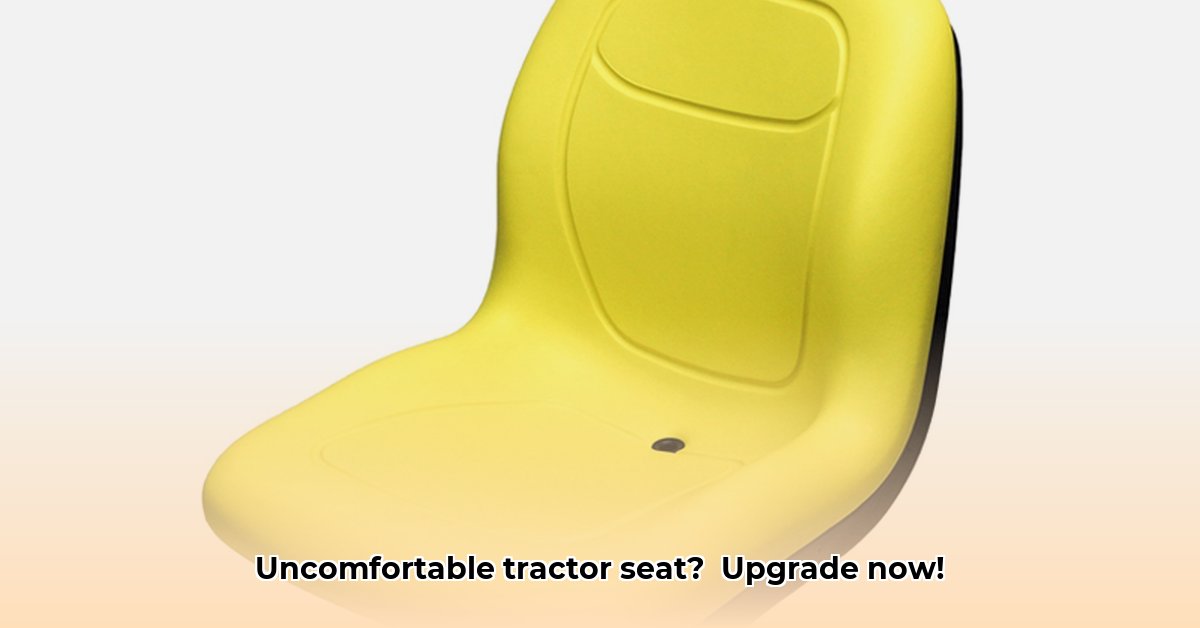
The Hidden Costs of Discomfort: Beyond Backaches
Farmers spend countless hours operating tractors. An uncomfortable seat isn't just inconvenient; it's a significant contributor to back pain, fatigue, and reduced productivity. Studies show a strong correlation between poor seating and musculoskeletal disorders among agricultural workers. But the cost isn't solely physical. Traditional tractor seats, often made from petroleum-based materials like vinyl, add to environmental strain. This article will guide you towards sustainable seat replacements, benefiting both your well-being and the planet. For more options, check out these sustainable seat covers.
Sustainable Seat Materials: A Comparative Analysis
Choosing a sustainable tractor seat involves understanding the environmental impact of different materials throughout their lifecycle. Let's examine some key options:
| Material | Environmental Impact | Durability | Cost | Pros | Cons |
|---|---|---|---|---|---|
| Conventional Vinyl | High | High | Low | Widely available, relatively inexpensive. | Significant environmental impact due to production and disposal; limited recyclability. |
| Bio-based Polymers (e.g., PLA) | Low to Moderate | Moderate to High | Moderate | Lower environmental impact, often renewable source; potentially recyclable. | Can be more expensive than conventional vinyl; durability may vary depending on specific formulation. |
| Recycled Materials (e.g., PET) | Low | Moderate | Moderate | Reduces landfill waste; lower environmental impact than virgin materials; often durable and cost-effective | Durability can vary depending on the quality of the recycled material; sourcing may be limited in some areas. |
Did you know? A recent study showed that replacing just 10% of conventional vinyl seats with recycled materials could reduce carbon emissions by a significant amount.
Choosing Your Sustainable Seat: A Five-Step Guide
Selecting the right sustainable seat involves careful consideration and a thoughtful process. Here's a step-by-step guide to help you make an informed decision:
Assess Your Needs: Prioritize comfort, durability, and budget. Consider climate conditions, average workday length, and any specific ergonomic requirements.
Research Manufacturers: Find manufacturers committed to transparency and sustainability. Look for certifications, detailed material sourcing information, and robust manufacturing processes.
Check for Eco-Certifications: Seek out certifications like GOTS (Global Organic Textile Standard) or others relevant to recycled content or sustainable manufacturing.
Evaluate Lifecycle Impact: Consider the seat's durability, repairability, and recyclability. A longer-lasting seat minimizes waste and long-term costs.
Compare Prices and Features: Balance the initial cost with the long-term value. Factor in durability, comfort, and the environmental impact of the selected material.
The Future of Sustainable Tractor Seats
Innovation in sustainable materials and manufacturing processes is constantly evolving. We can expect to see more bio-based options, improved recycling infrastructure, and potentially even government initiatives supporting the adoption of eco-friendly seats. This collaborative effort from manufacturers, researchers, and farmers will lead to more sustainable and comfortable options soon.
Conclusion: Invest in Your Comfort and Our Planet
Upgrading your tractor seat to a sustainable option is an investment in your health and the future of agriculture. By choosing eco-friendly materials, you contribute to a healthier environment and improve your working conditions. Remember, long-term comfort and sustainability go hand in hand. Make informed choices today for a more comfortable and responsible tomorrow.